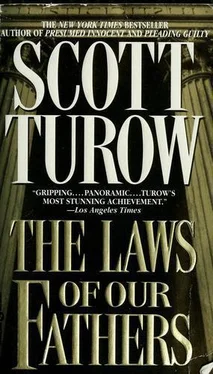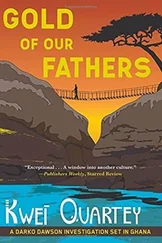Scott Turow - The Laws of our Fathers
Здесь есть возможность читать онлайн «Scott Turow - The Laws of our Fathers» весь текст электронной книги совершенно бесплатно (целиком полную версию без сокращений). В некоторых случаях можно слушать аудио, скачать через торрент в формате fb2 и присутствует краткое содержание. Жанр: Криминальный детектив, на английском языке. Описание произведения, (предисловие) а так же отзывы посетителей доступны на портале библиотеки ЛибКат.
- Название:The Laws of our Fathers
- Автор:
- Жанр:
- Год:неизвестен
- ISBN:нет данных
- Рейтинг книги:5 / 5. Голосов: 1
-
Избранное:Добавить в избранное
- Отзывы:
-
Ваша оценка:
- 100
- 1
- 2
- 3
- 4
- 5
The Laws of our Fathers: краткое содержание, описание и аннотация
Предлагаем к чтению аннотацию, описание, краткое содержание или предисловие (зависит от того, что написал сам автор книги «The Laws of our Fathers»). Если вы не нашли необходимую информацию о книге — напишите в комментариях, мы постараемся отыскать её.
The Laws of our Fathers — читать онлайн бесплатно полную книгу (весь текст) целиком
Ниже представлен текст книги, разбитый по страницам. Система сохранения места последней прочитанной страницы, позволяет с удобством читать онлайн бесплатно книгу «The Laws of our Fathers», без необходимости каждый раз заново искать на чём Вы остановились. Поставьте закладку, и сможете в любой момент перейти на страницу, на которой закончили чтение.
Интервал:
Закладка:
' Seth, it's not how I feel about you that matters. I'm twenty-two. If I was thirty-two, if I was forty-two and we were together, that would be one thing. But I want a life. My own life. I've never lied to you. Or led you on. Have I?'
'Sonny, I don't have any choices now.'
‘I know, baby, and that's what makes it hard. Because what you're doing is important. And I support it. But thinking it through, I've spent hours, days – And look, how is this any different than if you were doing something else that was important – if you got into grad school somewhere or found a great job someplace? Suppose somebody offered you a job in Hollywood, writing movies? You'd go. Right? Would you expect me to jump up and follow you?'
Most of these discussions ended up as fights – bitter, accusatory. Without Hobie, I felt bereft, especially as my parents grew more frantic. One night late in March, Sonny and I arrived home from a movie on campus to hear the second phone ringing in our apartment. It was my mother, no doubt hoping to twist my innards. She was beleaguering me, calling almost daily, either to implore me to come home to visit them or to see if magically I had divined some alternative to going to Canada. 'Oh man.' I was in no mood.
'Call them back,' Sonny suggested. But I went to the phone. It was, instead, my father. There were few pleasantries. He got to the point.
'Your mother has informed me that if you carry through with this plan to emigrate, she feels we have no choice but to follow you wherever you settle.'
For quite some time neither of us said anything further. It seemed preposterous. My parents never vacationed, never left Kindle County, travel for them long before having lost any association with pleasure.
'You're kidding.'
'Deadly serious,' he said.
'She's crazy,' I finally managed.
'We share an opinion,' my father replied. My mother, no doubt, was standing nearby, a hand poised dubiously near her mouth as she listened.
'Have you tried to talk her out of this?'
'Repeatedly.'
'You're not coming, are you?'
'Me? My business, as you know, is here. At my age the possibility of starting again in another city – let alone another country-is unthinkable.' Retirement was unmentionable. Without an income stream, my father would feel cut off from his vital source.
'So?'
'Your mother is determined.'
'She wouldn't go without you. Who would take care of her?' My father did not answer at first. ‘I do not know precisely what she envisions. Her son, of course, will be nearby.'
A sound of pure agony escaped me. 'Will she talk to me?'
He spoke to her momentarily, then informed me sternly, 'No. There are no discussions. This is, you see, a decided matter. PUrikt'
I was reeling, but crawling through me was the unlikely sensation of some sympathy for my father. He sounded collected, almost cheerfully so, but if she left, I knew he would sink into the clutches of his own peculiarities, afraid to venture beyond home, spooked by wrath and paranoia.
'Seth, I hope this goes to illustrate-' My father could not continue. His voice shook, with either rage or the humiliation of having to prevail upon me. But eventually he forced himself to finish. 'I hope you will reconsider.'
I waited quite some time, but told him at last what I always did: I had no choice.
'This is not a plan,' he cried. 'This is madness. You have no concept of what you are doing. How will you support yourself?' my father asked, always to him the foremost question. 'You cannot provide for yourself, let alone two people.'
'She's not coming,' I said. 'You know she's not coming.'
'On the contrary,' he said. 'Can you not see what is happening?' Of course, gradually, I could. For more than thirty years my mother had accepted my father's stiff personality, his thousand rules, as the price of his assurance he would safeguard her and me. Now, if he could not honor that compact, she considered herself the victim of a fraud. There was no use talking to her about the damage in her own life, because that was beside the point. She had long since agreed to an existence where she had ceased craving satisfaction in her own right, as if that only invited further terror. Her credo was simple: My child is my country. My duty. My life. She had survived solely so as not to abandon the future. No matter how ghastly it seemed, I knew she would follow me. While that reality crept over me, my father went on with his denunciations.
'Do you know what it is to be a penniless immigrant with no means in a country that is not your own? I have some idea. War is not the only thing in life that is intensely unpleasant, Seth. I will say to you what I have said to your mother: If you choose this course, if you cross this border, do not expect to receive aid from me.'
'I know better than that, Dad. Believe me.'
'You know better about everything, Seth.'
'I will never ask you for money.' We had now reached the absolute core of what was between us. 'Underline: never. Do you hear me?' He did not. He had already hung up.
Someone said that money is the root of all evil. For my father it was far more than that. Originally a professor of economics at the U., he eventually became a consultant to banks and brokerage houses, one of the first of the nation's money supply experts. As a result, I heard the theoretical justifications throughout my life: How money is the medium through which everybody competes for what they want – the more you want something, the more you'll pay. It's emotion made tangible, or comparable at least, a sort of river Ganges of life into which all desires somehow pour. A perfect theory, I suppose, ignoring things like how much everybody has to start with, or what the songwriter had in mind when he declared that the best things in life are free. But at least it recognizes that if you want money, you really want something else. What my father wanted, though, was never clear to me.
His name was Bernhard and thus he was frequently confused with Bernard Weissman, a Kindle County developer of vast wealth who owned the Morgan Towers in DuSable and several of the largest shopping malls in the country. 'No, I am the poor Weissman,' my father would always say, in a tone which, given his modulated manner, struck me as ridiculously abject. I knew that he was doing well – this came from the comments of his business acquaintances whom we met on the street – but he made no admission of the fact and seemed to die inside any time he had to spend a dollar.
In college, a group of us in the dorm used to conduct Legendary
Cheap Contests, exploring a strange common ground in which we matched, competitively, the miserliness of our parents. My main rivals were other ethnic sons, Slavs and Greeks, although there was one Yankee who was usually in the race. But I always won. My father took the cake. Our dormmates roared as I told the stories: How my father, rather than replace the evergreens in front of our simple hip-roofed bungalow, colored them with green spray paint after they died one particularly harsh winter. How my father would return merchandise to stores, two or three years after purchase, when a button broke, a collar frayed, and haggle for some partial refund of the original price. How my father would keep important clients, bankers, waiting, so he could go buy a case of toilet tissue on sale. How my father late at night could be found refolding the brown lunch bags that I brought home from school, per his instructions, balled in my coat pocket. How my father put a timer on the bathroom light because as a little boy I often forgot to turn it out, with the result that I was frequently left terrified, still sitting on the can as the room went black.
Yet it wasn't the lack of possessions but the atmosphere that mattered most. My father wasn't motivated by a spiritual disdain for material things; he felt none of the pleasure of people of little means, who enjoy the few things they can afford. There was a tight-fisted compulsive quality to my father's refusal to spend, a kind of death grip he held on the household against which I always chafed, and which had led to our most wrenching prior dispute at Christmas time in 1963.
Читать дальшеИнтервал:
Закладка:
Похожие книги на «The Laws of our Fathers»
Представляем Вашему вниманию похожие книги на «The Laws of our Fathers» списком для выбора. Мы отобрали схожую по названию и смыслу литературу в надежде предоставить читателям больше вариантов отыскать новые, интересные, ещё непрочитанные произведения.
Обсуждение, отзывы о книге «The Laws of our Fathers» и просто собственные мнения читателей. Оставьте ваши комментарии, напишите, что Вы думаете о произведении, его смысле или главных героях. Укажите что конкретно понравилось, а что нет, и почему Вы так считаете.












